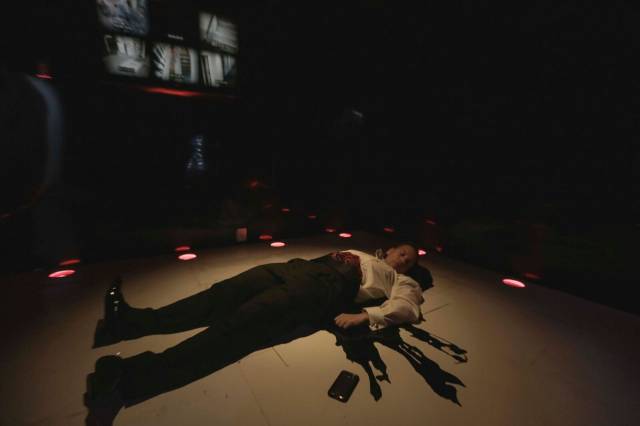

Look, I'm as gung-ho as one could be when it comes to immersive theater. All right, so I've historically cringed at the "do we have any volunteers in the audience?" question, but I've always been the first to suggest a murder mystery dinner party, and the last to break character. Add my undying love of crime drama to this Freudian gumbo, and you'll surely understand why I jumped at the chance to review PARADISO: Chapter 1, a new work created/directed by Michael Counts that blends theatrical immersion with the Escape the Room genre that's rapidly growing in popularity (one of your friends went with her co-workers, I guarantee it), using Dante’s Divine Comedy as its narrative backbone. Counts developed the work alongside a creative team that boasts credits across an impressive range of stage, screen and interactive media, including the city's most famous piece of immersive theater, Sleep No More.
My excitement mounted the week leading up to the performance as I and my plus one began to receive mysterious texts from ANONYMOUS, attempting to prepare us for the trial ahead. Links to newspaper articles, as well as a videotaped warning from a shadowy figure added up to a Dystopian conspiracy narrative (which might sound familiar if you’ve seen Mr. Robot season one) surrounding “an anonymous and massive corporation that is secretly running the world… the top 1% of 1%.” Further clues reveal its only visible manifestation, the Virgil Corporation, which is supposedly the “recruiting arm of the shadiest global-conglomerate in modern civilization.” Virgil Corp wants to recruit you, our cryptic patron warns.
The performance is held in the bustling, neon-drenched heart of Korea Town, at a secret location revealed by text the day before our scheduled escape. Entering, we were told to ask for Mr. Chen, and were soon lead to our adventure with four other couples (merely a coincidence, I believe it’s A-OK to go alone), all ten of us collectively running the gamut of emotions.
Now, since the pleasure in these adventures lies in the discovery, it wouldn’t be fair for me to reveal too much more. But what I’ll say is this: with traditional theater, especially in a thriller genre, you expect a certain thrust of narrative structure, a satisfying build-up and conclusion; with Escape the Room, you expect to feel the rush of success that comes with knowing you’ve completed a series of complex tasks. Perplexingly, PARADISO fails to fully deliver either sense. When we found ourselves suddenly ushered back into fluorescent light of the hallway after sixty harried minutes, most of us weren’t sure if it was even over or not, and as I boarded the elevator to leave, I felt an unshakable feeling of—I’m sorry to say it—disappointment.
I’ll qualify this. In all likelihood, the lack of structural cohesion lies in the company’s remarkable sense of ambition. They’re trying to pull off so much. And from the lead-up intrigue to the magnificently constructed, labyrinthine set, this was almost the most thrilling hour of my life. Suddenly, I was launched into my favorite genre, and all of my hours frittered away on crime drama, action movies and logic puzzles seemed about to pay off in a big way. But despite all of the build up and all of the time and effort put into constructing this world, my excitement quickly gave way to frustration. The narrative drops away in deference to spectacle, and the impetus behind who or what we’re escaping becomes increasingly murky.

Members of the group are essentially divided into two paths—those trying to follow the plot, and those trying to solve the puzzles of each room. Doing both is near impossible, especially given the event’s constricted time frame. I fell into the former of the two strategies, and there were multiple times I was still hunting for clues, only to realize that my teammates had solved the puzzle. Over five minutes into one room, a man in our group revealed a text that held answer; in a later room, another showed us a key he had been holding in his pocket from several rooms back. Sometimes it mattered, often it didn’t. Scattering red herrings throughout is necessary and fun; leaving no discernible pattern or what was relevant and what was arbitrary is disheartening and chaotic. One woman, who volunteered to be a group leader at the game’s offset but lost to a more vocal participant, hung towards the back, and told me in a frustrated sigh that the article she read to prepare seemed to have no matter in the game. Truthfully? She was right.
The actors peppered throughout the scenarios are suave, shocking and do indeed add to the heart-pounding immersion of the event, but… you can’t actually interact with them. I posed the same two questions, enthusiastically—desperately--to each one of them: Are you with Virgil Corporation!? Can we trust you!? Each time I was ignored. It just didn’t matter. And I so badly wanted it to matter!
Without question, Michael Counts is the mad genius he is touted to be, and PARADISO: Chapter One is far better than your average night spent at home. The sets are lavish and intricate, and the special effects from multi-media design and production company BeSIDE add to the madness. It isn’t easy to get a group of buttoned-up New Yorkers to scramble around like mice in a cage, and do that, he does. "Tell us something about yourself," an omniscient voice demanded of one of our players. She said, with a nervous laugh, what we were all thinking: "I'm so freaking scared right now."
There are chapters yet to come, and once his team irons out the kinks and adds a bit more narrative follow through, this just might become the talk of the town, and I’ll say I was there before you couldn’t get in. And hey, maybe next time, I’ll just approach it a different way. I’ll drink a couple of beers, take a few deep breaths, and remember that my life isn’t depending on my escape… or at least, I don’t think it is…